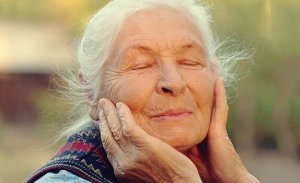Regulating Emotions in Old Age: The Key to Wellbeing


Written and verified by the psychologist Valeria Sabater
Correctly regulating emotions in old age is an exercise in health and well-being. Interestingly, researchers have found information from several studies that extends beyond the physical and cognitive decline. Older adults are, on average, much more attuned to positive emotions. They value social relationships and also have more control over their emotions.
Swiss philosopher Henri-Frederic Amiel said that knowing how to grow old is the masterpiece of sanity. He also said that it’s one of the most difficult parts to master about living. This isn’t easy to do. Reaching old age with the same optimism as a young person with their whole life ahead of them is hard. The key lies in looking at the present with humility, simplicity, and positivity.
“Old wood best to burn, old wine to drink, old friends to trust, and old authors to read.”
-Francis Bacon-
In old age, we’re faced with a decline in our body’s capabilities along with the progressive decline in our own faculties. However, elderly people are still able to maintain a subjective sense of happiness worthy of admiration. The correct emotional regulation in this final stage of life is evident in a good part of the population. Therefore, this helps to regulate aging.
Regulating emotions in old age is the key to well-being.

Regulating emotions in old age: The latest discoveries
The way the elderly regulate their emotions is a relatively new field of study. However, now that life expectancy has increased a great deal recently, it’s clear that this part of our population will be very important to our society in the coming years. Therefore, an essential challenge that we have before us is reaching old age in the best possible state. We’re not just talking about physical well-being. Above all, we’re focusing on the emotional plane.
This new field of research is maturing and growing. Dr. Derek Isaacowitz, an expert in the field of emotions at Yale University, has developed a technique to study the attentional biases of older people. He created glasses that record the wearer’s physical reaction. The glasses record this data for researchers to analyze later.
This research has proven that 90% of older adults are more interested in faces that show positive emotions. That preference, that constant search for a smiling face, a warm look, or a kind word, helps them self-regulate their own emotions. Experts believe that it’s as if the brain acts as a cognitive mediator by focusing its attention on these stimuli. In turn, this reduces negative emotions and the brain fills itself with positivity.

Emotions don’t deteriorate with the aging process
The first thing that happens with old age is a change in motivations. These long-term goals become restricted to investing in a better quality of life in the present. Therefore, the regulation of emotions in old age has a very specific purpose. Its motivations are defined. It seeks to optimize the emotional experience to enjoy balance, inner peace, and relationships with friends and family.
- In turn, all this constitutes what’s known as the paradox of well-being in old age. As striking as it may be, old people on average have a higher life satisfaction than young people. This is due to the fact that older people are better able to regulate their emotions. This mechanism doesn’t present a deterioration that is so common or parallel to the way the elderly’s cognitive processes decline.
- For example, we know that aging mainly affects the frontal lobes of the brain. This area of the brain contains our attention capacity, problem-solving, and ability to plan. However, emotions and our ability to interact with our surroundings through looks, smiles, and positive reactions is something that remains intact. This ability is resistant to diseases as serious and as sad as Alzheimer’s disease.

Old age makes us more selective
In many cases, when we’re young, we filter our reality. In our youth, we let everything come our way. We love to experiment with different things and people. We also accept everything with open arms and a willing heart. However, as we mature, we begin to use filters in our life. When we cross that threshold leading into the final stage of life, we receive a new vision. We drop those filters and become even more selective. We seek to prioritize and focus our attention only on things that can provide us with well-being and happiness rather than problems.
Psychologist and researcher Heiner Ellgring from the Max Planck Institute in Munich explained this phenomenon in his book The Reasons and Emotions of Old Age. According to him, the elderly focus on three aspects of life:
- Enjoying relationships with family and friends.
- Investing in their health.
- Taking care of and enjoying different things (home, garden, animals, etc.)
A positive life for an elderly person is a life in which they can focus on these aspects. The subjective happiness lies in these factors. The social, relational and affective aspect are the most important. Therefore, aging positively lies in being selective and having clear priorities. For the elderly, enjoying positive emotions on the daily is the biggest priority.
Correctly regulating emotions in old age is an exercise in health and well-being. Interestingly, researchers have found information from several studies that extends beyond the physical and cognitive decline. Older adults are, on average, much more attuned to positive emotions. They value social relationships and also have more control over their emotions.
Swiss philosopher Henri-Frederic Amiel said that knowing how to grow old is the masterpiece of sanity. He also said that it’s one of the most difficult parts to master about living. This isn’t easy to do. Reaching old age with the same optimism as a young person with their whole life ahead of them is hard. The key lies in looking at the present with humility, simplicity, and positivity.
“Old wood best to burn, old wine to drink, old friends to trust, and old authors to read.”
-Francis Bacon-
In old age, we’re faced with a decline in our body’s capabilities along with the progressive decline in our own faculties. However, elderly people are still able to maintain a subjective sense of happiness worthy of admiration. The correct emotional regulation in this final stage of life is evident in a good part of the population. Therefore, this helps to regulate aging.
Regulating emotions in old age is the key to well-being.

Regulating emotions in old age: The latest discoveries
The way the elderly regulate their emotions is a relatively new field of study. However, now that life expectancy has increased a great deal recently, it’s clear that this part of our population will be very important to our society in the coming years. Therefore, an essential challenge that we have before us is reaching old age in the best possible state. We’re not just talking about physical well-being. Above all, we’re focusing on the emotional plane.
This new field of research is maturing and growing. Dr. Derek Isaacowitz, an expert in the field of emotions at Yale University, has developed a technique to study the attentional biases of older people. He created glasses that record the wearer’s physical reaction. The glasses record this data for researchers to analyze later.
This research has proven that 90% of older adults are more interested in faces that show positive emotions. That preference, that constant search for a smiling face, a warm look, or a kind word, helps them self-regulate their own emotions. Experts believe that it’s as if the brain acts as a cognitive mediator by focusing its attention on these stimuli. In turn, this reduces negative emotions and the brain fills itself with positivity.

Emotions don’t deteriorate with the aging process
The first thing that happens with old age is a change in motivations. These long-term goals become restricted to investing in a better quality of life in the present. Therefore, the regulation of emotions in old age has a very specific purpose. Its motivations are defined. It seeks to optimize the emotional experience to enjoy balance, inner peace, and relationships with friends and family.
- In turn, all this constitutes what’s known as the paradox of well-being in old age. As striking as it may be, old people on average have a higher life satisfaction than young people. This is due to the fact that older people are better able to regulate their emotions. This mechanism doesn’t present a deterioration that is so common or parallel to the way the elderly’s cognitive processes decline.
- For example, we know that aging mainly affects the frontal lobes of the brain. This area of the brain contains our attention capacity, problem-solving, and ability to plan. However, emotions and our ability to interact with our surroundings through looks, smiles, and positive reactions is something that remains intact. This ability is resistant to diseases as serious and as sad as Alzheimer’s disease.

Old age makes us more selective
In many cases, when we’re young, we filter our reality. In our youth, we let everything come our way. We love to experiment with different things and people. We also accept everything with open arms and a willing heart. However, as we mature, we begin to use filters in our life. When we cross that threshold leading into the final stage of life, we receive a new vision. We drop those filters and become even more selective. We seek to prioritize and focus our attention only on things that can provide us with well-being and happiness rather than problems.
Psychologist and researcher Heiner Ellgring from the Max Planck Institute in Munich explained this phenomenon in his book The Reasons and Emotions of Old Age. According to him, the elderly focus on three aspects of life:
- Enjoying relationships with family and friends.
- Investing in their health.
- Taking care of and enjoying different things (home, garden, animals, etc.)
A positive life for an elderly person is a life in which they can focus on these aspects. The subjective happiness lies in these factors. The social, relational and affective aspect are the most important. Therefore, aging positively lies in being selective and having clear priorities. For the elderly, enjoying positive emotions on the daily is the biggest priority.
This text is provided for informational purposes only and does not replace consultation with a professional. If in doubt, consult your specialist.







